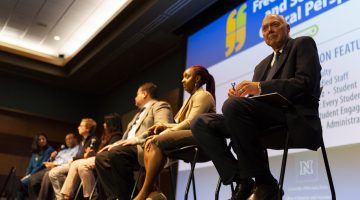A spectre is haunting America — the spectre of political correctness.
The year is 2015. The polar ice caps are melting, Donald Trump is leading the Republican candidates for the presidency and America is paralyzed by the fear of being policed by the politically correct.
Last week, Republican candidate Ben Carson made headlines when he said he “would not advocate that we put a Muslim in charge of this nation” in an interview with NBC News. The comment sparked rightful criticism of Carson’s blatant prejudice against Muslim Americans. Yet Carson’s response was not to apologize, but to blame the backlash on a culture of political correctness “imposed by the secular progressives and those who wish to fundamentally change our society.”
Though Carson would have us believe that political correctness will destroy the foundations of American society, we must ask ourselves: Will a fundamental change in how the various groups in America interact be a detriment?
America is not a utopia where everyone enjoys full equality. It is a society largely shaped by institutionalized racism, sexism and classism, the effects of which are still felt by many today. When groups who have been denied social and political self-determination ask to be spoken to with a basic amount of respect, are they asking too much? Certainly not.
Yes, it’s something that would fundamentally change our society, but imagine an America in which its citizens weren’t made to feel inferior based off of their race, gender and a multitude of other arbitrary classifications.
This is not the first time political correctness has been the subject of the GOP’s wrath. Front-runner Donald Trump said in the first primary debate, “I think the big problem this country has is being politically correct. I’ve been challenged by so many people and I don’t, frankly, have time for total political correctness. And to be honest with you, this country doesn’t have time, either.”
Despite what Trump and Carson’s comments may imply, political correctness is not a boogeyman plaguing our nation and ruining our values. It is not the liberal censorship of free speech that the radical right has made it out to be. Rather, it is a necessary precursor for the creation of an American culture that respects and includes all groups regardless of party affiliation.
Political correctness is not about having time to be respectful; it’s about caring enough for your fellow people to be respectful.
Perpetuating insensitivity toward and disrespect of certain groups only serves to further alienate those who have been historically marginalized. These individuals are human beings, full of the same desires, emotions and potential as everyone else. One person’s desire to say what they wish without consequence does not outweigh another person’s fundamental right to be treated with decency.
There are certain instances in which the representation of a lack of political correctness serves a valuable social function. The most visible instance of this is in art, notably literature, film and satire. For instance, the removal of Mark Twain’s “Huckleberry Finn” from required readings lists across the nation for its representation of racial stereotypes sparked ire from free speech advocates and literary buffs alike.
The reason for this is simple — the omission of crucial historical context from our cultural lexicon deadens conversation as a whole. To censor works that serve as a representation of America’s checkered past is to pretend that it didn’t happen. Education, and art in general, serves as a stepping stone to an American culture that acknowledges past transgressions, and uses that knowledge to create a society where those transgressions no longer exist.
Moreover, it is often college campuses, the traditional bastions of liberal thought, that go as far as to censor students and speakers in the name of political correctness. In this regard, comedians and satirists have long taken pleasure in lampooning the overly sensitive colleges of modern-day America.
In this regard, censorship of literature and speech is, by and large, unacceptable. However, simply wanting not to offend, wanting to include everyone in civil discourse and wanting all Americans to experience life with dignity is not ridiculous. Without the idea of being politically correct, bigotry will spread unimpeded.
In the words of the ever-chill Big Lebowski, “The aggression will not stand, man.”
We can’t let it.
The Nevada Sagebrush editor desk can be reached at tbynum@sagebrush.unr.edu and on Twitter @The Sagebrush.











